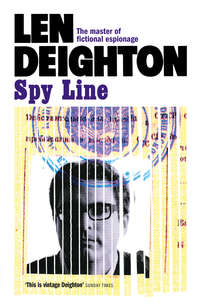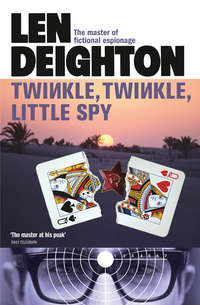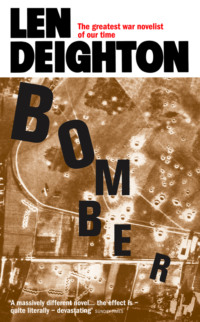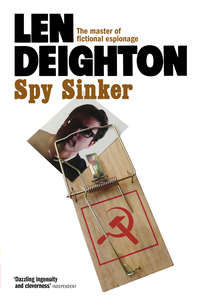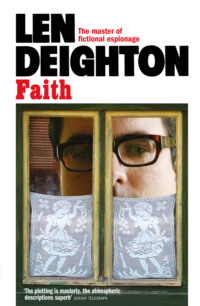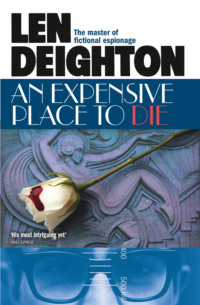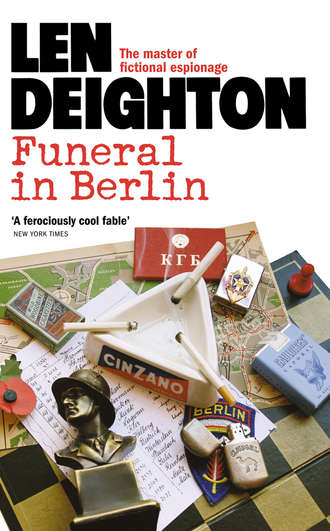
Полная версия
Funeral in Berlin
Hallam offered me a hand like a dead animal. ‘Best enzyme man,’ he said.
I nodded. ‘In the world,’ I said, and eased sideways through the partly open door.
‘Give him this,’ said Hallam. He pushed a wrapped cube of Lyons sugar into my hand.
‘Semitsa?’ I said very quietly.
‘The milkman’s horse, you silly. There. Friendly creature. And if you do see Confucius …’
‘OK,’ I said. I walked down the steps into the hot dusty sunlight.
‘My goodness. I haven’t paid you back for the gasmeter shilling,’ said Hallam. It was a simple statement of fact; he wasn’t turning his pockets out.
‘Donate it to the RSPCA,’ I called. Hallam nodded. I looked around but there was no sign of Confucius anywhere.
1 Over £2,000.
2
ROBIN JAMES HALLAM
Saturday, October 5th
After his visitor had left Hallam looked in the mirror again. He was trying to guess his age.
‘Forty-two,’ he said to himself.
His hair was all there, that was one good thing. A man with plenty of hair looked young. It would need a little colouring of course but then colouring his hair was something he had thought of doing for years before he had this problem of finding a new job. ‘Brown,’ he thought, ‘a mousy brown.’ So that it wouldn’t be too obvious; no point in going in for one of those really bright colours because it would be spotted as phoney in two minutes. He turned his head and tried to see how much of his profile he could see in reflection. He had a lean, very aristocratic Anglo-Saxon face. The nose had sharp ridges and the cheekbones were tight under his skin. A thoroughbred. He often thought of himself as a racehorse. It was a pleasant thought and one that was easily associated with acres of green grass, horse shows, grouse-shooting, hunt balls, elegant men and bejewelled women. He liked to think of himself in that context even though his function as a thoroughbred was nearer the seat of Government. He liked that; the seat of Government. Hallam laughed at his reflection and his reflection laughed back in a friendly, dignified, handsome way. He decided to tell someone at the office but it was difficult to decide which one of them would appreciate the joke – so many of them were dullards.
Hallam walked back to the gramophone. He stroked the shiny immaculate veneer top and took pleasure in the silent way it opened; well-made – British made. He selected a record from his large collection. They were all there, all the finest composers of the twentieth century. Berg, Stravinsky, Ives. He selected a recording of a work of Schönberg. The shiny black disc was impeccable. It was as hygienic and dustfree as as as … why wasn’t there anything as clean as his records? He put it on the gramophone and applied the pick-up head to the merest brim of the record. He did this skilfully. There was a faint hissing noise, then the room was suddenly full of rich sounds: ‘Variations for wind band’. He liked it. He sat well back in his chair, fidgeting his back to find the exact position of maximum comfort like a cat. ‘Like a cat,’ he thought and he was pleased with that thought. He listened to the plaited threads of the instrumental sounds and decided that when the music stopped he would have a cigarette. ‘After both sides,’ he thought: ‘after I’ve played both sides I will have a cigarette.’ He rested back in the chair again, pleased with the self-imposed discipline.
He thought of himself as a monk-like person. Once, in the toilet at the office, he had heard one of the junior clerks refer to him as an ‘old hermit’. He had liked that. He looked around at his cell-like room. Every item there had been carefully chosen. He was a man who understood quality in the old-fashioned sense of the word. How he despised those people who have a fancy modern oven and then only heat frozen supermarket food in it. All he had was a gas ring but it was what you cooked on it that counted. Fresh country eggs and bacon, there was nothing in the world to beat that. Cooked carefully, cooked in butter even though he wasn’t a man given to extravagance. Few women understood how to cook eggs and bacon. Or anything else. He remembered a housekeeper he had had at one time, she always broke the yolks of the eggs and had tiny black burnt specks on the whites. She didn’t clean the pan properly. It was as simple as that. She didn’t clean the pan properly. The times he had told her. He walked across to the washbasin and looked in the mirror. ‘Mrs Henderson,’ he mouthed the words, ‘you simply must clean the pan with paper – not with water – thoroughly before you fry eggs and bacon.’ He gave a pleasant smile. It wasn’t a nervous smile, on the other hand it wasn’t the sort of smile that encouraged argument. It was in fact exactly the right sort of smile for this situation. He rather prided himself on his ability to provide the right sort of smile for every occasion.
The music was still playing but he decided to have a cigarette anyway, he certainly wasn’t going to become a slave to his own machine. What he decided to do was to compromise. He could have a cigarette but it would be one of the Bachelor brand – the cheap ones that he kept in the large cigarette box for visitors. He rather prided himself on his ability to compromise. He went across to the cigarette box. There were four in there. He decided not to take one of those. Four was about right. Yes. He got a Player’s No. 3 from a box of twenty that he kept in the cutlery drawer. ‘Thirty-nine,’ he thought suddenly. ‘That’s what I shall give as my age.’
The sound ended abruptly. Hallam took the record and washed it and dressed it and put it to bed with tender devotion. He remembered the girl who had given him the record. That red-haired girl he met at the awful Saddle Room. A pleasant girl in a way. American, volatile, rather incoherent in her speech mannerisms, but then Hallam supposed that there were no proper schooling facilities in America. He felt sorry for the girl. No he didn’t. He didn’t feel sorry for any girls, they were all … carnivorous. What’s more some of them were none too clean. He thought about this man that Dawlish had just sent along to see him; he wouldn’t be at all surprised if he had been to school in America. Hallam picked up the Siamese cat.
‘Where is your little sister?’ he asked her. If only they could talk. They were more intelligent than many humans. The cat stretched its legs and the long claws sank into the shoulder of Hallam’s suit and dragged at it with a tearing sound.
‘Secret Service man?’ thought Hallam. He laughed out loud and the cat looked up in surprise.
‘Upstart,’ said Hallam.
He put a finger against the cat’s ear. The cat purred. An upstart from Burnley – a supercilious, anti-public-school technician who thought he was an administrator.
‘We must do our duty,’ said Hallam quietly to himself. It was the duty of men in Government; they mustn’t be too influenced by the personalities of Government servants. He preferred to think of the Secret Service man as a Government servant rather like the man with the wart who did the savings bank accounts at the Post Office. He said ‘Government servant’ aloud and thought of all the ways he could work the phrase into the next conversation he had with that man.
Hallam put the Player’s No. 3 into his real ebony cigarette holder. He lit it while watching himself in the mirror. He parted his hair a little more towards the centre. He might as well lunch at the coffee bar. They did a very fine egg and chips there. The waiter was Italian and Hallam always ordered in Italian. Not very trustworthy the Italians, Hallam decided, it’s all a matter of breeding. He sorted out his change and put ninepence in his ticket pocket for a tip. He gave a final look round before leaving. Fang was asleep. The ashtray that his visitor had used was brimming with cigarette ends. Foreign, coarse, cheap, inferior cigarettes.
Hallam picked up the ashtray with a shudder and tipped the contents into the little bin where the tea-leaves went. He felt in many ways the type of cigarette that man smoked typified him. So did the man’s clothes, they were mass-produced, off-the-peg clothes. Hallam decided he did not like the man that Dawlish had sent to see him. He didn’t like him at all.
3
Where pieces are used to protect other pieces, there will be high casualty rate. Better by far to assign only pawns to supporting roles.
Saturday, October 5th
‘Best enzyme man in the world,’ I said.
I heard Dawlish cough.
‘Best what?’ he said.
‘Enzyme man,’ I said, ‘and Hallam would just love him.’
‘Good,’ said Dawlish. I flipped the switch of my squawk box and turned back to the documents on my desk.
‘Edmond Dorf,’ I read.
I riffed through the battered British passport.
‘You are always saying that foreign names are more convincingly English,’ said my secretary.
‘But not Dorf,’ I said, ‘especially not Edmond Dorf. I don’t feel like an Edmond Dorf.’
‘Now don’t go metaphysical on me,’ said Jean, ‘Whom do you feel like?’
I liked that ‘whom’ – you’ve got to pay real money these days to get a secretary that could say that.
‘Eh?’ I said.
‘What sort of name do you feel like?’ said Jean very slowly and patiently. It was a danger signal.
‘Flint McCrae,’ I said.
‘Act your age,’ said Jean and she picked up the Semitsa file and walked towards the door.
‘I’m not being horrible Edmond Dorf,’ I said a little louder.
‘You don’t have to shout,’ said Jean, ‘and I’m afraid the travel vouchers and tickets are ordered. Berlin has been told to expect Edmond Dorf. If you want it changed now you must do it yourself unless I leave the Semitsa work.’
Jean was my secretary, really it was her job to do as I told her.
‘OK,’ I said.
She said, ‘Let me be the first to congratulate you on a wise decision, Mr Dorf,’ and left the room quickly.
Dawlish was my boss. He was around fifty, slim and meticulous like a well-bred boa-constrictor. He moved with languid English grace across the room from his desk and stood staring out into the jungle of Charlotte Street.
‘They thought one wasn’t serious at first,’ he said to the window.
‘Uh huh,’ I said; I didn’t want to appear too interested.
‘They thought I was joking – even the wife thought I wouldn’t go through with it.’ He turned away from the window and fixed me with a mocking gaze. ‘But now I’ve done it and I don’t intend to kill them off.’
‘Is that what they want you to do?’ I said. I wished I had been listening more closely.
‘Yes,’ he said, ‘and I’m not going to do it.’ He walked across to me in the big leather armchair like Perry Mason appealing to the jury. ‘I like weeds. It’s as simple as that. Some people like one sort of plants and some people like others. I like weeds.’
‘They are easy to cultivate,’ I said.
‘Not really,’ said Dawlish sharply. ‘The most powerful ones tend to strangle the others. I’ve got hedge parsley, comfrey, meadow cranesbill, primroses … it’s just like a country lane, not a damned by-pass. One has wild birds and butterflies. It’s something to walk in; not one of these things with flower-beds, laid out like a cemetery.’
‘I agree,’ I said. I agreed.
Dawlish sat down at his antique desk and arranged some typewritten sheets with file cards that his secretary had brought from the IBM machine. He aligned all the paperwork in geometrical patterns with his pencils and stapling machine and then began to polish his spectacles.
‘And thistles,’ said Dawlish.
‘Pardon?’ I said.
‘I’ve got a lot of thistles,’ said Dawlish, ‘because they attract butterflies. Later we’ll have tortoise-shells, red admirals, yellow brimstones, perhaps even commas. Fabulous. The weed-killers are destroying life in the country – it’s a disgrace.’ He picked up one of the folders and began to read it. He nodded once or twice and then put it down.
‘I rely on you to be discreet,’ he said.
‘That sounds like a change of policy,’ I said. Dawlish sprinkled a cold smile over me. He wore the sort of spectacles that customs men tap for hollow noises. He rested them on his large ears and then tucked a handkerchief as big as a bedsheet into his cuff. It was a signal that we were what Dawlish called ‘on parade’.
Dawlish said, ‘Johnnie Vulkan’. Then he rubbed the palms of his hands together.
I knew the sort of thing Dawlish was going to complain about now. We had other people in Berlin, of course, but Vulkan was the one we always used; he was efficient, understood what we needed, he knew the Berlin layout and, most important, he was noisy enough to draw attention away from our residential boys whom we preferred to let lie fallow as long as possible.
Dawlish was saying ‘… can’t expect any of our people to be saints …’ I remembered Vulkan. He could deliver a bomb or a baby and smile as he did it.
‘… no orthodox way of collecting information and there never can be …’ Vulkan may have had a mixed political background but he knew Berlin. He knew every cellar, bandstand, bank account, brothel and abortionist from Potsdam to Pankow. Dawlish sniffed loudly and rubbed his hands again.
‘Even earning additional payments need not be out of the question but unless he gives us full details of these associations he will no longer enjoy the protection of this department.’
‘Protection,’ I said. ‘What sort of protection have we ever offered him? The only protection he ever had from us was old-fashioned money. People like Vulkan are in danger – physical danger – every moment of every day. The only weapon they have is money. If Vulkan is always asking for more, it’s worth considering the motives.’
‘Men like Vulkan don’t have motives,’ said Dawlish. ‘Don’t misunderstand me. Vulkan is working for us – however remotely – and one will work like the very deuce to see that he is looked after, but don’t move this discussion into the sublime world of philosophy. Our friend Vulkan changes his motive every time he comes through that East Berlin checkpoint. When men become double agents it’s just a matter of time before they lose their grip on reality. They begin to drown in a sea of confusion. Any piece of information they can snatch at will keep them afloat and alive for a few more hours.’
‘You want to write Vulkan off?’
‘Not at all,’ said Dawlish, ‘but one does want to keep him in a cul-de-sac. A fellow working against us can be very useful if we have him in a nice sterile test-tube.’
‘You are being a bit complacent,’ I said. Dawlish raised an eyebrow.
‘Vulkan is good,’ I said. ‘Look at his record. 1948: his blockade prediction was with this department eleven weeks before FOIU1 and fifteen weeks before Ross had heard anything. He can’t do that if you are selecting his drinking companions.’
‘Wait now …’ said Dawlish.
‘Let me finish, sir,’ I insisted. ‘The point I’m making is, that the moment Vulkan feels we are putting him on ice he’ll shop around for another job. Ross at the War Office or O’Brien at the FO will whip him into the Olympia Stadion2 and that’s the last we will see of him. Certainly they will all tut-tut and agree with you at the Combined Intelligence Meetings but they’ll go behind your back and employ him.’
Dawlish touched his finger-tips together and looked at me sardonically.
‘You think I am too old for this job, don’t you?’
I said nothing.
‘If we decide not to continue with Vulkan’s contract there is no question of leaving him available for the highest bidder.’
I didn’t think old Dawlish could make me shiver.
1 Foreign Office Intelligence Unit.
2 West Berlin HQ. MI6 use the offices.
4
The Berlin Defence is a classic defence by means of counter-attack.
Sunday, October 6th
The parade ground of Europe has always been that vast area of scrub and lonely villages that stretches eastward from the Elbe – some say as far as the Urals. But halfway between the Elbe and the Oder, sitting at attention upon Brandenburg, is Prussia’s major town – Berlin.
From two thousand feet the Soviet Army War Memorial in Treptower Park is the first thing you notice. It’s in the Russian sector. In a space like a dozen football pitches a cast of a Red Army soldier makes the Statue of Liberty look like it’s standing in a hole. Over Marx-Engels Platz the plane banked steeply south towards Tempelhof and the thin veins of water shone in the bright sunshine. The Spree flows through Berlin as a spilt pail of water flows through a building site. The river and its canals are lean and hungry and they slink furtively under roads that do not acknowledge them by even the smallest hump. Nowhere does a grand bridge and a wide flow of water divide the city into two halves. Instead it is bricked-up buildings and sections of breeze block that bisect the city, ending suddenly and unpredictably like the lava flow of a cold-water Pompeii.
Johnnie Vulkan brought a friend and a black Cadillac to meet me at Tempelhof.
‘Major Bailis, US Army,’ said Johnnie. I shook hands with a tall leathery American who was buttoned deep into a white Aquascutum trench coat. He offered me a cigar while the baggage was being checked.
‘It’s good to have you with us,’ said the major and Johnnie said the same.
‘Thanks,’ I said. ‘This is a town where one needs friends.’
‘We’ve put you into the Frühling,’ the major said. ‘It’s small, comfortable, unobtrusive and very, very Berlin.’
‘Fine,’ I said; it sounded OK.
Johnnie moved quickly through the traffic in the sleek Cadillac. Cutting across the city from west to east is a ten-lane highway that successive generations have named ‘Unter den Linden’ and ‘Strasse des 17. Juni’ and once was a gigantic path leading through the Brandenburger Tor to the royal palace.
‘We just call it Big Street,’ said the American as Johnnie moved into the fast lane. In the distance the statue on the Tor glinted gold in the afternoon sun, beyond it in the Soviet sector a flat concrete plain named Marx-Engels Platz stood where communist demolition teams had razed the Schloss Hohenzollern.
We turned towards the Hilton.
Just a little way down the street beyond the shell of the Gedächtniskirche with its slick modern tower – like a tricky sort of hi-fi speaker cabinet – apeing the old broken one is Kranzlers, a café that spreads itself across the Kurfürstendamm pavement. We ordered coffee and the US army major sat on the far side of the table and spent ten minutes tying the laces of his shoes. Across in the ‘Quick Café’ two girls with silver hair were eating Bockwurst.
I looked at Johnnie Vulkan. Growing older seemed to agree with him. He didn’t look a day over forty, his hair was like a tailored Brillo pad and his face tanned. He wore a well-cut Berlin suit of English pinhead worsted. He leaned back in his chair and pointed a finger lazily towards me. His hand was so sunburned that his nails seemed pale pink. He said, ‘Before we start, let’s get one thing clear. No one here needs help; you are superfluous to requirements as far as I am concerned. Just remember that; stay out of the way and everything will be OK. Get in the way and …’ He shrugged his shoulders. ‘This is a dangerous town.’ He kept his hand pointing into my face and gave a flash of a smile.
I looked at him for a moment. I looked at his smile and at his hand.
‘Next time you point a finger at someone, Johnnie,’ I said, ‘remember that three of your fingers are pointing back at you.’ He lowered his hand as though it had become heavy.
‘Stok is our contact,’ he said quietly.
I was surprised. Stok was a Red Army colonel in State Security.1
‘It’s official then?’ I asked. ‘An official exchange.’
Vulkan chuckled and glanced at the major.
‘It’s more what you might call extra-curricular. Official but extra-curricular,’ he said again, loud enough for the American to hear. The American laughed and went back to his shoelace.
‘The way we hear it, there is a lot of extra-curricular activity here in Berlin.’
‘Dawlish been complaining?’ Vulkan asked, captiously.
‘Hinting.’
‘Well, you tell him I’ll have to have more than my present lousy two thousand a month if it’s exclusive service he’s after.’
‘You tell him,’ I said. ‘He’s on the phone.’
‘Look,’ said Vulkan, his solid gold wristwatch peeping out from the pristine cuff. ‘Dawlish has no idea of the situation here. My contact with Stok is …’ Vulkan made a movement with his cupped hand to indicate a superlative.
‘Stok is one thousand times brighter than Dawlish and he runs his show from on the spot, not from an office desk hundreds of miles away. If I can bring Semitsa over the wire it will be because I personally know some important people in this town. People I can rely on and who can rely on me. All Dawlish has to do is collect the kudos and leave me alone.’
‘What I think Dawlish needs to know,’ I said, ‘is what Colonel Stok will require in return if he delivers Semitsa – what you call – over the wire.’
‘Almost certainly cash.’
‘I had a premonition it would be.’
‘Wait a minute, wait a minute,’ said Vulkan, loud enough to bring the American out of his reverie. ‘Major Bailis is the official US Army observer for this transaction. I don’t have to put up with dirty talk like that.’
The American took off his sun-glasses and said, ‘Yes, siree. That’s the size of it.’ Then he put his glasses back on again.
I said, ‘Just to make quite sure that you don’t promise anything we wouldn’t like: make sure I’m there at your next meeting with comrade Colonel Stok, eh?’
‘Difficult,’ said Johnnie.
‘But you’ll manage it,’ I said, ‘because that’s what we pay you for.’
‘Oh yes,’ said Vulkan.
1 KGB (see Appendix 4).
5
When a player offers a piece for exchange or sacrifice then surely he has in mind a subsequent manœuvre which will end to his advantage.
Monday, October 7th
Brassieres and beer; whiskies and worsteds; great words carved out of coloured electricity and plastered along the walls of the Ku-damm. This was the theatre-in-the-round of western prosperity: a great, gobbling, yelling, laughing stage crowded with fat ladies and dwarfs, marionettes on strings, fire-eaters, strong men and lots of escapologists. ‘Today I joined the cast,’ I thought. ‘Now they’ve got an illusionist.’ Beneath me the city lay in huge patches of light and vast pools of darkness where rubble and grass fought gently for control of the universe.
Inside my room the phone rang. Vulkan’s voice was calm and unhurried.
‘Do you know the Warschau restaurant?’
‘Stalin Allee,’ I said; it was a well-known bourse for information pedlars.
‘They call it Karl Marx Allee now,’ said Vulkan sardonically. ‘Have your car facing west in the car park across the Allee. Don’t get out of your car, flash your lights. I’ll be ready to go at 9.20. OK?’
‘OK,’ I said.
I followed the line of the canal from the Berlin Hilton to Hallesches Tor U-Bahnstation, then turned north on to Friedrichstrasse. The control point is a few blocks north. I flipped a passport to the American soldier and an insurance card to the West German policeman, then in bottom gear I moved across the tram tracks of Zimmerstrasse that bump you into a world where ‘communist’ is not a dirty word.
It was a warm evening and a couple of dozen transients sat under the blue neon light in the checkpoint hut; stacked neatly on tables were piles of booklets and leaflets with titles like ‘Science of the GDR in the service of Peace’, ‘Art for the People’ and ‘Historic Task of the GDR and the future of Germany’.
‘Herr Dorf.’ A very young frontier policeman held my passport and riffed the corners. ‘How much money are you carrying?’



